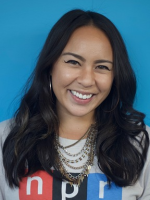MICHEL MARTIN, HOST:
We're two weeks into the new year, and I'm guessing at least a few of you set some goals for yourselves to achieve in 2022. When it comes to New Year's resolutions, a very popular goal traditionally has to do with losing weight. But before you break out that calorie counter, you might want to reevaluate the role that diet culture plays in your life and your language. Life Kit's Andee Tagle has more.
ANDEE TAGLE, BYLINE: There are so many reasons why we might want to change our bodies - a New Year's resolution, bullying, social media - but the real culprit is something called diet culture. Our collective set of social expectations...
NADIA CRADDOCK: Telling us that there's one way to be and one way to look and one way to eat, that we are a better person, we're a more worthy person if our bodies are a certain way and if we eat a certain way.
TAGLE: That's Nadia Craddock, a body image researcher at the Center for Appearance Research in the U.K. She says it's important to remember that diet culture can be sneaky and go by lots of different names like wellness or a healthy lifestyle or getting strong.
CRADDOCK: But it's just a rebranding. There's that very common error of equating health and fitness as one and the same and that you can tell how healthy someone is by their body size.
TAGLE: Thinness and health are not the same, and fatness does not necessarily equate to being unhealthy. To untangle yourself from this complex diet culture web, Bay Area-based therapist and psychologist Sand Chang says you can start by practicing awareness with your language. Diet culture is probably more prevalent than you think.
I ate way too much. I'm never eating again.
SAND CHANG: Diet culture.
TAGLE: I have to work out today. I took two days off last week.
CHANG: Diet culture.
TAGLE: You look great. Did you lose weight?
CHANG: Diet culture.
TAGLE: Some of these coded comments might sound pretty neutral, even nice. Who doesn't want to hear, hey, you look amazing? But when it's followed up with a have you lost weight?
CRADDOCK: On face value, it sounds like a positive thing, but that's really about endorsing and reinforcing those ideas that to be thinner is to be better. What happens when they regain the weight? Are they no longer amazing?
TAGLE: Good or bad, weight talk can be loaded. And this also applies to the way you talk to yourself.
CHANG: To me, a positive relationship with your body means that you are willing to do the things that any other relationship requires. So you take time. You listen. You pay attention to its needs. You treat it with compassion. There is communication both ways.
TAGLE: Be honest. Would you talk to your best friend the way you currently talk to your body? Just as important is the way you let other people talk to you, says Virgie Tovar, a San Francisco-based author and public speaker whose work centers on ending weight-based discrimination.
VIRGIE TOVAR: And I know especially in communities of color - like, I mean, I grew up in one - I know that that is very taboo to kind of, like, tell your aunt or somebody who is older than you, you don't get to talk about me like that, or, I don't have to sit here and take this.
TAGLE: If you're sensitive to diet talk and you know you're headed into a potentially thorny situation, prepare. Tovar encourages people to write scripts ahead of time and to lean into their authentic voice. For example, can you use humor to diffuse diet talk? Arm yourself with data, or maybe just find your own best and kindest version of, hey, man, cut it out - because the less time you spend on diet-fueled negativity, the more time and freedom you have to spend elsewhere.
TOVAR: At the end of the day, diet culture is extremely intellectually tiresome. It takes a lot of effort to think about it and to constantly be doubting yourself and disliking yourself. And, you know, what else could we do with that time?
TAGLE: For NPR News, I'm Andee Tagle.
MARTIN: For more on diet culture, go to lifekit.npr.org.
(SOUNDBITE OF MUSIC) Transcript provided by NPR, Copyright NPR.


